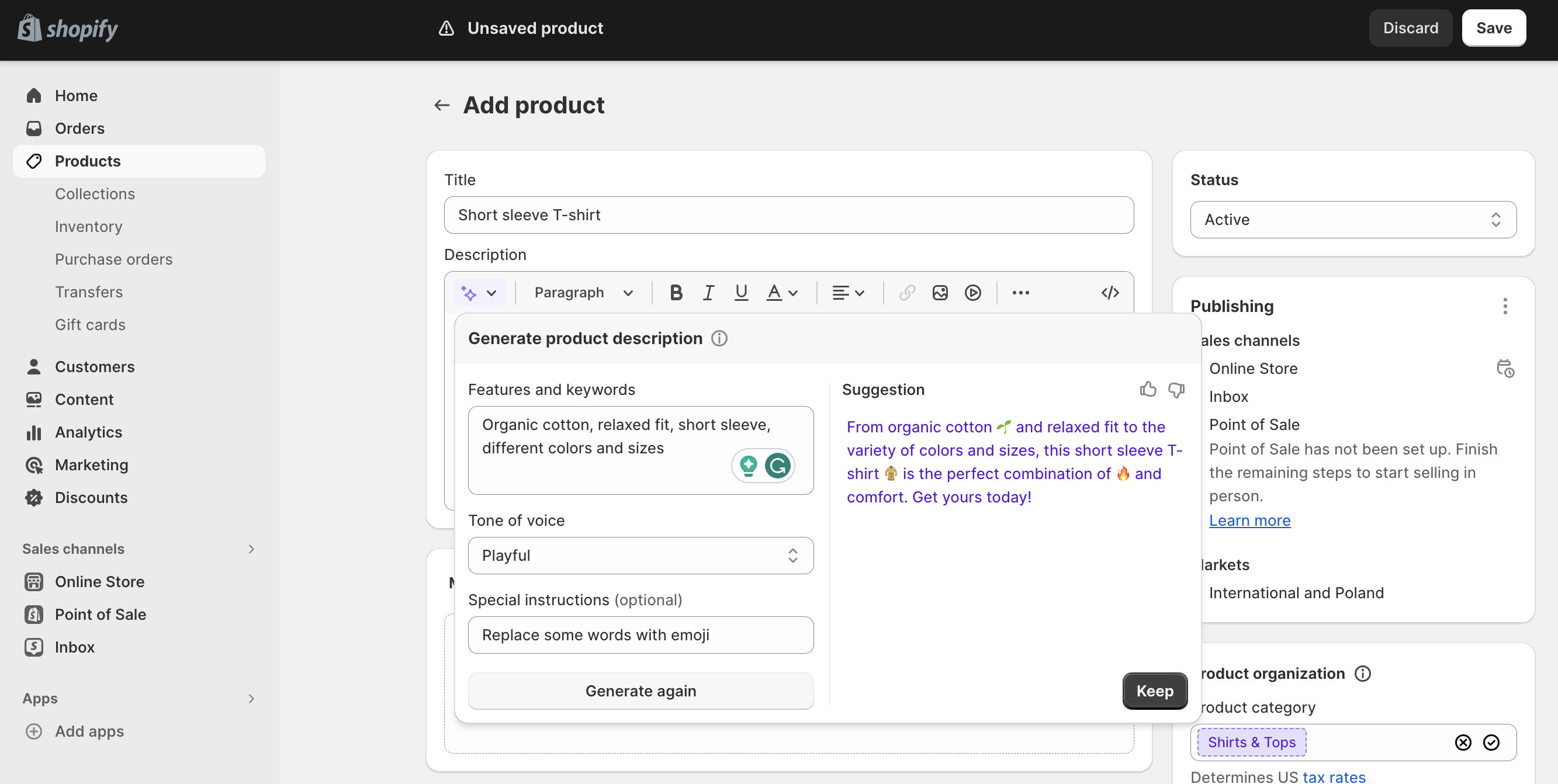Managing inventory is an essential yet challenging task for merchants. Thankfully, artificial intelligence (AI) is stepping in to transform this aspect of business. AI brings a new layer of efficiency and accuracy to inventory management. It is vital for the success of online stores, particularly those using popular platforms like Shopify and Magento.
What is inventory management?
Inventory management in e-commerce is a crucial aspect of running an online store. It’s all about keeping the right balance of stock to meet customer demand. You’d want to avoid overstocking or running out of products.
You need to have enough items to fulfill orders promptly, but not so much that your storage space is overflowing with unsold products.
Here’s how it works:
Tracking stock levels
This is the bread and butter of inventory management. You need to know how much of each product you have on hand. This helps in making informed decisions about restocking. So you can avoid the dreaded “Out of Stock” status that can drive customers away.
Forecasting demand
By analyzing past sales data and current market trends, you can predict which products are likely to be in high demand. This helps in planning your inventory accordingly, ensuring you’re never caught off guard by a sudden spike in sales.
Managing supplier relationships
Keeping a good rapport with your suppliers means you can restock quickly and negotiate better terms or discounts. This is essential for maintaining a healthy inventory level without breaking the bank.
Streamlining order fulfillment
Efficient inventory management speeds up the order fulfillment process. When you know exactly where each item is and how much you have, packing and shipping orders become a breeze.
Reducing costs and waste
Overstocking can lead to additional storage costs and, potentially, to waste if products expire or go out of fashion. Proper inventory management helps in minimizing these risks.
Exploring AI in E-commerce
In essence, AI in e-commerce is more than a tech upgrade; it’s a game-changer. It transforms how businesses interact with customers, manage their inventory, and make decisions. It’s about being smart, responsive, and ahead of the curve in a fast-moving digital marketplace.
Here’s a breakdown of the key areas where AI is making a significant impact:
Personalized customer experience
- AI dives deep into customer data to tailor shopping experiences.
- Uses past purchases, and browsing habits, to recommend products.
- Launches targeted marketing, connecting customers with what they love.
AI inventory management
- AI can be used to predict product demand, making stock levels just right.
- Helps take control of stock replenishment, avoiding over or under-stocking.
- AI for inventory management means smarter, leaner storage costs.
Customer service automation
- AI chatbots are always on, providing round-the-clock support.
- They handle questions and solve problems, making customer service smooth.
- This AI-powered help means quicker responses and happier customers.
Data analysis and insights
- AI algorithms crunch numbers on customer trends and market shifts.
- They turn complex data into clear insights, guiding business strategy.
Using AI for inventory control and sales decisions becomes data-driven.
AI in E-commerce inventory management
Managing inventory can feel like a tightrope walk. But what if we tell you that AI is here to be your safety net? That’s right, using AI for inventory management is a smart strategy to keep your business thriving. Let’s explore how AI is making inventory management more efficient.
AI’s impact is increasingly evident yet still developing in inventory management. AI has not yet achieved complete automation in this domain. However, its capabilities to simplify and enhance inventory management processes are significant and worth exploring.
Forecast the demand
Currently, artificial intelligence in inventory management is akin to a skilled assistant. It’s not a full-fledged manager yet. AI excels in handling large data sets, identifying patterns, and making predictive analyses.
AI algorithms can help you predict trends based on historical data. But they may not fully grasp sudden market shifts or unique consumer behaviors that human experience and intuition can catch. You as a business owner play a critical role in interpreting AI-generated insights. You should make decisions that align with your brand’s values and customer expectations.
Spot-on demand forecasting
AI can analyze past sales, seasonal trends, and global market changes. This helps predict customer needs and enhance user experience for your shoppers.
Full control of your warehouse
Using AI for inventory control helps you know not only what to stock, but also how much and when. It enables fine-tuning of your warehouse restocking. This way, you’re prepared to meet customer demand without locking up too much money in unused stock.
Enhance customer fulfillment
AI in inventory management is like having a personal shopper for every customer. It understands buying habits and preferences. So, you can ensure that what your customers are looking for is always within reach. This level of personalization leads to quicker delivery times and a lot of happy shoppers.
Automate the mundane
Let’s face it, inventory management involves a lot of repetitive tasks. For example, writing descriptions for new items. AI inventory systems take over these chores, freeing up your team to focus on more strategic tasks.
The two most popular tools for AI inventory management
Let’s consider the most popular tools for two popular platforms – Magento and Shopify. These are the official tools developed by these companies. It means that they are perfectly aligned with e-commerce needs and requirements.
Adobe Sensei for smarter inventory management in Magento
Alva Commerce specializes in custom Magneto development. Thus, we acknowledge that inventory management is crucial for e-commerce success.
Adobe Sensei GenAI features AI and machine learning prowess. It offers a range of solutions to transform this challenge into an opportunity. Let’s delve into the specific ways Adobe Sensei can elevate inventory management for Magento users.
Predictive analytics: forecasting at its finest
Understand future trends
Adobe Sensei shines in its ability to analyze past sales and customer behaviors. This offers a clear idea of upcoming needs. So, it’s easier for you to decide how much stock to have.
Optimize stock
Using this tool, you can predict future demand. This helps keep your inventory balanced. So, you’re well-stocked to meet customer needs without the burden of excess.
Detect abnormalities
Adobe Sensei is adept at identifying outliers or anomalies in your data. It can analyze historical trends and patterns, flagging any deviations. This is particularly useful in spotting unusual traffic spikes or drops in sales. It also helps detect changes in customer behavior that might otherwise go unnoticed.

Leverage advanced AI features for Magento sales boosting
Additionally, Adobe Sensei also offers advanced personalization of product suggestions.
Another feature of this platform is live search. With Adobe Sensei, searching for products on Magento becomes more intuitive. It helps customers find exactly what they’re looking for swiftly.
Efficient search and personalization functions contribute to faster sales and better inventory rotation. Learn more about other AI and smart tools for increasing sales in our dedicated blog post.
Shopify Magic: your AI partner for streamlined inventory management
As a turnkey Shopify development company, we understand that efficient inventory management is a must. That’s where Shopify Magic steps in. It is free of charge and available for all subscription plans.
It comprises both smart management tools and a revolutionary AI assistant – Shopify Sidekick. This AI tool is designed to make your life easier, handling those time-consuming tasks with ease. Let’s dive into how Shopify Magic can become an indispensable part of your inventory management strategy.

Automate repetitive tasks
Shopify Sidekick shines when it comes to automating routine tasks. This means you can focus more on growing your business and less on the nitty-gritty details.
For example, you can task it to change prices for items in bulk or update items’ descriptions.
Sidekick takes care of such tasks. So you get back valuable time to invest in strategic planning and other core business activities.
Streamline product updates and data entry
Shopify Magic uses AI for inventory management to transform complex workflows. Whether it’s managing product updates or handling meticulous data entry tasks, it ensures everything runs smoothly and with fewer errors.

For example, you can streamline and simplify the addition of new items by using AI-generated product descriptions.
How to make the most of Shopify Sidekick
- Interact with Sidekick using everyday language. Ask about stock levels, request inventory performance analyses or any other inventory-related questions you might have.
- Utilize Sidekick’s AI capabilities to gain insights into inventory trends, customer preferences, and market dynamics. This information can significantly inform and refine your inventory strategies.
- Employ Shopify Sidekick to automate various inventory tasks and streamline your workflows. This reduces the time and effort you spend on managing your inventory, allowing you to focus on what matters – growing your business.
For more insights, check out our dedicated article on Shopify Magic.
Navigating integration challenges in AI for inventory management
Integrating AI into your existing inventory systems can feel like fitting a square peg into a round hole. It’s common to face hurdles along the way, but with the right approach and support, these challenges can be transformed into opportunities for growth.
Let’s explore some common integration challenges and how Alva Commerce can guide you through them.
Common integration challenges
Compatibility issues
One of the biggest challenges is ensuring that the new AI system works seamlessly with your existing inventory software. Mismatched systems can lead to data silos and operational hiccups.
Data quality and quantity
AI systems require high-quality, abundant data to function effectively. Inadequate or poor-quality data can hinder the AI’s learning and prediction accuracy.
Change management
Introducing AI involves changing existing processes and possibly your organizational culture. Resistance to change among staff can be a significant barrier.
Technical expertise
Implementing AI requires a certain level of technical know-how, which your current team may not possess.
Simplify your e-commerce journey with Alva Commerce
At Alva Commerce, we understand these challenges and have tailored solutions to address them. By partnering with us, your business benefits from:
Seamless system compatibility
Our team specializes in ensuring that your AI tools are perfectly matched with your existing systems.
Smooth transition and training
Alva Commerce provides comprehensive training and support. We aim to ensure your team is comfortable and confident in using the new tools.
Expert technical support
Our team of experts is equipped to handle the technical complexities of AI integration. We ensure a smooth and hassle-free implementation process.
Conclusion
Despite all the limitations, the potential of AI to simplify inventory management is immense. AI automates everyday tasks and gives you valuable insights while minimizing human mistakes. This lets you concentrate on making strategic choices and expanding your business.
Essentially, AI takes care of the data-intensive work, allowing you to use your expertise where it matters most.
AI hasn’t mastered inventory management yet, but its impact in simplifying the process is clear. For e-commerce business owners, adopting AI involves balancing tech efficiency with human insight.










